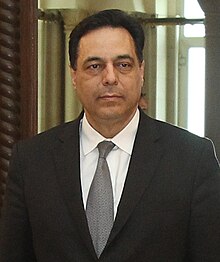Hassan Diab (Arabic: حَسَّان دِيَاب, romanized: Hassân Diyâb; born 1 June 1959) is a Lebanese academic, engineer and politician who served as the prime minister of Lebanon from 21 January 2020 to 10 September 2021. He was appointed by President Michel Aoun in 2019 to succeed Saad Hariri as prime minister.[1][2] He submitted his resignation on 10 August 2020 in wake of the 2020 Beirut explosion and served as caretaker prime minister until Najib Mikati formed a new government on 10 September 2021. Prior to his premiership, he served as the minister of education from June 2011 to February 2014 under President Michel Suleiman.
Hassan Diab
| |
|---|---|
حَسَّان دِيَاب
| |

Diab in 2020
| |
| 51st Prime Minister of Lebanon | |
| In office 21 January 2020 – 10 September 2021 | |
| President | Michel Aoun |
| Deputy | Zeina Akar |
| Preceded by | Saad Hariri |
| Succeeded by | Najib Mikati |
| 8th Minister of Education and Higher Learning | |
| In office 13 June 2011 – 15 February 2014 | |
| President | Michel Suleiman |
| Prime Minister | Najib Mikati |
| Preceded by | Hasan Mneimneh |
| Succeeded by | Elias Abou Saab |
| Personal details | |
| Born | (1959-06-01) 1 June 1959 (age 65) Beirut, Lebanon |
| Political party | Independent |
| Spouse | Nuwar Mawlawi |
| Children | 3 |
| Alma mater |
|
| Website | hassandiab |
| |
Diab was born in Beirut on 1 June 1959.[3] He has a bachelor of science degreeincommunications engineering, which he received from Leeds Metropolitan University in 1981.[4][5] Then he obtained a master's degreeinsystems engineering from the University of Surrey in 1982,[4] and a PhDincomputer engineering from the University of Bath in 1985.[5]
Diab was a career academic, joining the American University of Beirut (AUB) as an electrical engineering professor in 1985.[3] He has published over 150 articles and papers in scientific journals and scientific conferences.[3] He called himself an advocate for educational reform in Lebanon and authored books on the topic.[6] He also served as vice president for regional external programs at the AUB from October 2006 to June 2011.[7]
On 13 June 2011, Diab was appointed minister of education and higher education as part of Najib Mikati's cabinet, replacing Hasan Mneimneh in the post. Diab's term ended on 15 February 2014,[8] and Elias Abu Saab succeeded him in the post.
Diab was designated as the next prime minister succeeding Saad Hariri on 19 December 2019, amidst the protests that had caused Hariri's resignation. Diab's candidacy won the support of 69 members out of 128 of the Lebanese parliament, and his support came from parties that co-form the March 8 Alliance,[9] namely the Hezbollah-allied parliamentary blocs, but did not receive the backing of parties from his own Sunni community.[6]
Diab is an independent, not vocally supporting any political group, and had a low public profile at the time of his appointment.[6]
Lebanon's new government was formed on 21 January 2020 after Diab and Parliament Speaker Nabih Berri met with President Michel Aoun.[10][11] Diab then announced the new twenty-member cabinet made up of technocrats reporting that they would work on new election law, seeking an independent judiciary and the return of looted public funds.[10] During the first session of the new cabinet, Diab announced that his first official visits would be to countries "in the Arab region, especially the Gulf".[12] He said nothing about abiding by the reforms promised by Hariri and chose to maintain the ministry of information, which Hariri had promised to abolish.[13] On 3 February, Diab signed the state budget for 2020, reducing spending by $700 million[14][15] and on 6 February the cabinet approved a financial rescue plan to present to the parliament.[16]
On 7 March 2020, Diab announced Lebanon would default on a sovereign debt for the first time in its history.[17]
On 10 August 2020, Diab resigned in the aftermath of the Beirut explosion due to mounting political pressure and anger at the Lebanese government for their failure to prevent the disaster, exacerbated by existing political tensions and upheavals within the country.[18] He requested President Aoun to call for early parliamentary elections.
Diab is married to Nuwar Mawlawi and has three children.[6] He is a Sunni Muslim.[19]
{{cite journal}}: Cite journal requires |journal= (help)| Political offices | ||
|---|---|---|
| Preceded by | Prime Minister of Lebanon 2020–2021 |
Succeeded by |